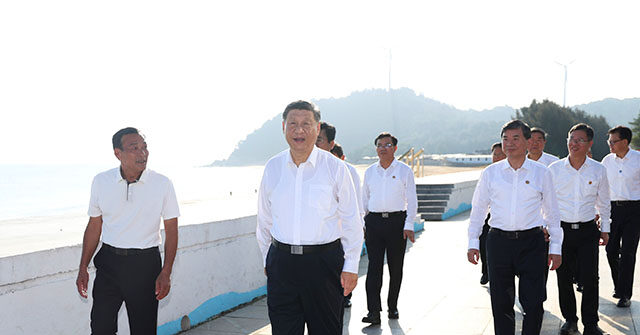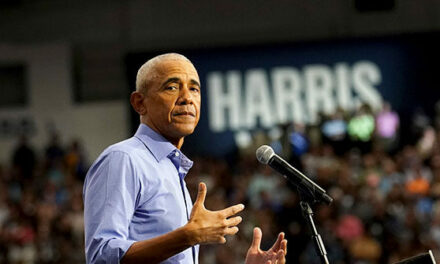We support our Publishers and Content Creators. You can view this story on their website by CLICKING HERE.

Genocidal Chinese dictator Xi Jinping visited the coastal province of Fujian, state media reported Wednesday, and stopped on a local island facing Taiwan just days after ordering intimidating war games in the wars surrounding the island nation.
Communist China has escalated its antagonistic rhetoric against Taiwan, which it falsely claims as a renegade province, since October 10, Taiwan’s National Day. Taiwanese President Lai Ching-te delivered a speech to mark the occasion in which he suggested his country could in the future collaborate on issues such as climate change with Beijing. He also, however, affirmed his nation’s sovereignty and noted that Taiwan, formally the Republic of China, was founded before the Communist People’s Republic of China, outraging Beijing.
Following the speech, the People’s Liberation Army (PLA) held massive war games near Taiwan, which it regularly coordinates to intimidate Taiwan and as a show of force to third party nations to deter support for Taipei. Xi’s visit to Fujian occurred some days later and state media did not overly highlight the potential connection to Taiwan.
According to the government’s Xinhua News Agency, Xi traveled to Fujian to discuss improving China’s disastrous economy and developing the province’s rural countryside.
“Fujian, a forerunner in the country’s reform and opening up drive, is an economic powerhouse with a robust private economy,” Xinhua claimed. “Facing Taiwan across the Taiwan Strait, the province is building itself into a demonstration zone for cross-Strait integrated development.”
Xi reportedly did discuss attempting to eradicate Taiwanese identity from Fujian, however, describing it as “enhancing the sense of the Chinese national and cultural identity among Taiwan compatriots.” For part of his visit, the state-run Global Times propaganda newspaper reported, Xi “learned about local efforts in strengthening the protection of cultural heritage and promoting cultural exchanges across the Taiwan Straits.”
The vast majority, 67 percent, of Taiwanese nationals identify as primarily Taiwanese; that number goes up to 83 percent among Taiwanese aged 18 to 34, according to a Pew Research Center poll published in January. Only three percent of respondents said they felt primarily. Chinese.
Furthermore, a survey published last week by Taiwan’s Institute for National Defense and Security Research found that over half, 64 percent, of Taiwanese considered China a “serious threat” and nearly 68 percent said they would personally fight to defend Taiwan from China.
The South China Morning Post noted that Xi traveled to Dongshan county in Fujian, an island facing Taiwan, on Tuesday. While state media did not describe Xi’s presence as related to the nation’s armed forces, the newspaper recalled that Dongshan “has served as a regular base for PLA exercises in the past.”
The day before Xi surfaced in Dongshan county, the PLA announced land, sea, and air drills surrounding Taiwan, intended as a response to Lai’s National Day speech embracing the reality of his country’s sovereignty. Chinese officials transparently described the drill as meant to silence discussion of Taiwan as a country.
“This exercise serves as a firm response to Lai Ching-te’s continued fabrication of ‘Taiwan independence’ fallacies and his propagation of separatist agendas,” Chen Binhua of Beijing’s Taiwan Affairs Office proclaimed.
Chinese Defense Ministry spokesman Senior Col. Wu Qian told reporters that China was “willing, with utmost sincerity and effort, to strive for peaceful reunification. However, we do not promise to renounce the use of force, and we will not leave even the slightest space for Taiwan independence.”
The Chinese Foreign Ministry defended the military exercises on Tuesday, insisting, “Taiwan is part of China, and the Taiwan question is purely China’s internal affair that brooks no external interference.”
Taiwanese observers described Lai’s offending speech as largely intended to extend an olive branch to Beijing. Lai said his country was “willing to work with China on addressing climate change, combating infectious diseases, and maintaining regional security.” He rejected China’s incorrect claims to controlling his country, however.
“The Republic of China and the People’s Republic of China are not subordinates to each other. On this land, democracy and freedom are thriving. The People’s Republic of China has no right to represent Taiwan,” he said. Lai promised to “uphold the commitment to resist annexation or encroachment upon our sovereignty.”
The Chinese government appeared particularly incensed, however, that he noted Taiwan as a nation was older than communist China: “The Republic of China may actually be the motherland of citizens of the People’s Republic of China who are over 75 years old.”
The Republic of China was founded in 1911, while the “people’s republic” was founded in 1949.
The Chinese Foreign Ministry responded with outrage to Lai’s October 10 speech.
“Taiwan is an inalienable part of Chinese territory. The government of the People’s Republic of China is the sole legal government representing the whole of China,” Foreign Ministry spokeswoman Mao Ning insisted in remarks to reporters. “No matter what they say or do, the Lai Ching-te authorities cannot change the fact that both sides of the Taiwan Strait belong to one and the same China, or stop the historical trend that China will and must achieve reunification.”
Mao attacked the Taiwanese government, which Beijing incorrectly views as a separatist organization, in remarks on Thursday in response to India allowing Taiwan to open a representative office in Mumbai.
“There is but one China in the world and Taiwan is an inalienable part of China’s territory,” Mao claimed. “China strongly opposes all forms of official contact and interaction between Taiwan and countries having diplomatic relations with China, including the establishment of representative offices for each other.”

 Conservative
Conservative  Search
Search Trending
Trending Current News
Current News 







